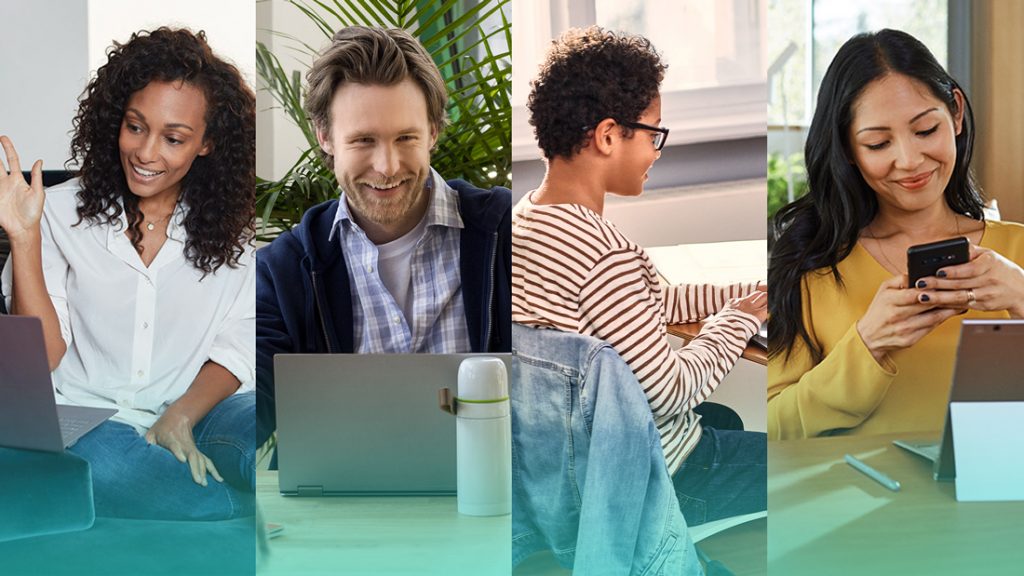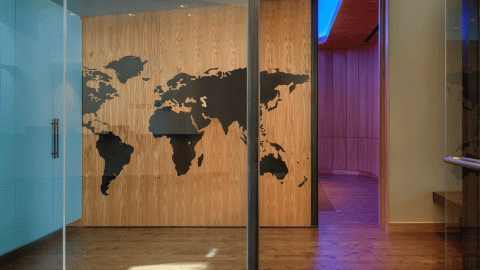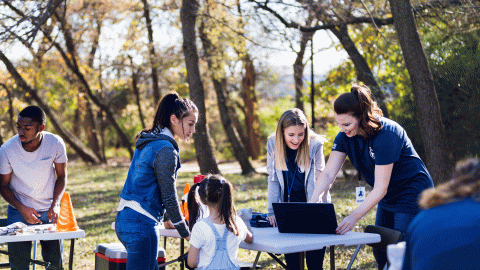Digital good: What it is and how to have more of it in your online life
Dating and debates, music festivals and dance classes, work and education – an increasing amount of our social interactions now take place online.
With this shift to virtual venues, ensuring kindness and respect in everyday interactions and encounters is more important than ever.
The digital space has become a fundamental part of the national and international conversation, and has also, at times, become a breeding ground for bullying, trolling and hate speech.
There is a clear need for more “digital good” to ensure that online encounters have a constructive impact on everyone involved.
But what is digital good? What does it mean and how can we embrace it?
Digital good can help build and sustain trust
Put simply, digital good means showing more kindness and respect in our everyday encounters to ensure that online interactions have a constructive impact on everyone involved.
It can be seen as the opposite of the damaging behavior that we all witness online from time to time.
One measure of online behavior is the Microsoft Digital Civility Index (DCI) 2020, a comprehensive survey published in February of more than 16,000 people in 32 countries. They shared their views on the tone and nature of their digital interactions, giving key insights into the opinions of adults aged 18 to 74 and teens from 13 to 17.
The geographical reach of the DCI has more than doubled since 2016
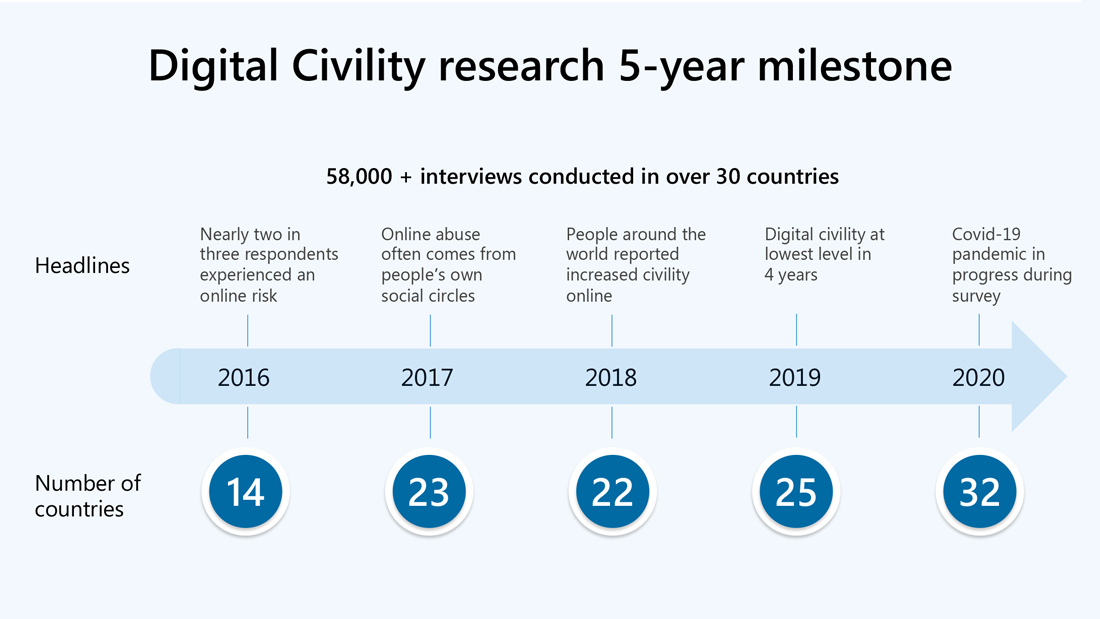
Source: Microsoft Digital Civility Index 2020 results deck
This year marks the five-year milestone of the DCI. The latest surveys were carried out in April and May 2020, near the start of the global disruption caused by the Covid-19 pandemic.
The statistics speak for themselves when it comes to harm being done online, as shown by the negative experiences and subsequent feelings of remorse the DCI has uncovered.
Bullying and harassment have become routine encounters for too many people. The DCI found that 40% of teenagers and 37% of adults said they’ve been involved in such incidents. One in five people reported being the target of hate speech, while almost one-third said they’ve been exposed to online hoaxes, scams or fraud.
The vast majority of people expressed remorse for negative behavior after the event, with 79% of respondents telling the DCI’s authors they subsequently regretted instigating or contributing to bullying.
[READ MORE: You can view the DCI in more detail at the Microsoft Digital Civility page.]
The good news is that following some basic practices can help counter these problems.
One way is to adopt four positive tenets that Microsoft has identified as the Digital Civility Challenge.
There is a clear need for more ‘digital good’ to ensure that online encounters have a constructive impact on everyone involved.
At the heart of this challenge are four ideals that express actions and reactions to which we can all commit as we engage online.
The first of these is to live by the golden rule of acting with empathy, compassion and kindness in every interaction. This rule encourages people to think about how they like to be treated and to treat others with the same dignity and respect they themselves would hope to receive.
The next ideal talks about the importance of respecting differences. Whether cultural, political or pertaining to aspects of a person’s identity, thoughtful disagreement can be healthy, but resorting to personalized hostilities is not. If someone puts forward a view you disagree with, try to find a way to offer an alternative perspective without dismissing theirs.
The third ideal addresses something many of us have seen online. One minute, two people are disagreeing, and the next, harsh words are exchanged and the situation deteriorates. But it needn’t be like that. When the conversation starts to become heated, pausing before responding can prevent things getting out of hand.
The fourth ideal reminds people of the need to take action if someone they’re engaging with online makes them feel uncomfortable or unsafe. That often means telling someone about it. This is a particularly important message for parents, teachers and caregivers to exemplify in their own interactions and pass on to young people in their care.
[READ MORE: How sharing data is helping fight the spread of Covid-19 in the UK]
The Council for Digital Good
Focusing on these areas to increase digital civility is an important first step. But there is also a broader need to better understand online attitudes and pressures, and to learn about and consider alternative approaches.
In 2017, Microsoft created the inaugural Council for Digital Good, a pilot program that brought together 15 teenagers from across the U.S. to work with Microsoft on how best to encourage constructive behaviors online. In particular, that meant focusing on how to understand, recognize and reduce digital risks while simultaneously promoting safer, healthier and more respectful online interactions.
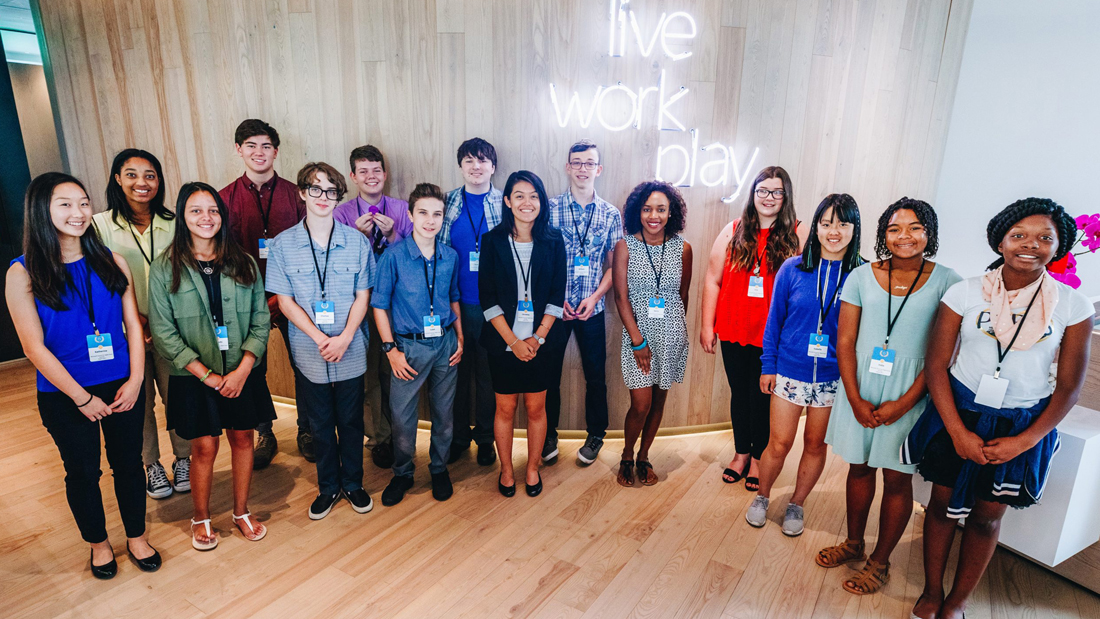
The window for applications to join the next council closed on March 1, after which a second cohort of young people from diverse backgrounds from across the U.S. will take part in 18-month program of activities. It will culminate in a public forum in Fall 2022, travel conditions permitting.
During the inaugural meeting of the 2017 council, members highlighted some of the challenges they faced and together identified a number of concerns, many of which are still relevant today.
Social platforms are crafted to encourage as much participation and engagement as possible. That can lead some people to continually share – or overshare in some cases – personal information. That may even result in feelings akin to addiction as individuals seek reassurance and validation via social media likes and shares.
Council members also raised the fact that this same desire for approval could lead to people creating online personas that weren’t true to themselves. That lack of authenticity could result in people being unable to be honest and open about their feelings.
[READ MORE: Promoting trusted information in response to Covid-19]
Jacob Sedesse, from Florida, was part of that first council. In the January 2021 Microsoft blog post that announced the launch of the second council, he said: “I was so honored and grateful that my voice was taken into consideration and that my early internet experiences, good and bad, meant something.”
Encouraging people to adopt better standards of online behavior is not something that can be left to legislators and regulators alone. In addition to the important role of public policy, especially in relation to hate speech, threats and misinformation, everyone needs to take responsibility for their actions and be accountable.
It falls to each individual on the internet to think about the kinds of engagement that are positive and beneficial so that, together, more digital good is added into the virtual world.
For more on how Microsoft works to help find solutions to issues like these, visit Microsoft On the Issues. And follow @MSFTIssues on Twitter and LinkedIn.
NOTE: This story was updated on July 26, 2021 to reflect that the applications for the next council have been closed.

